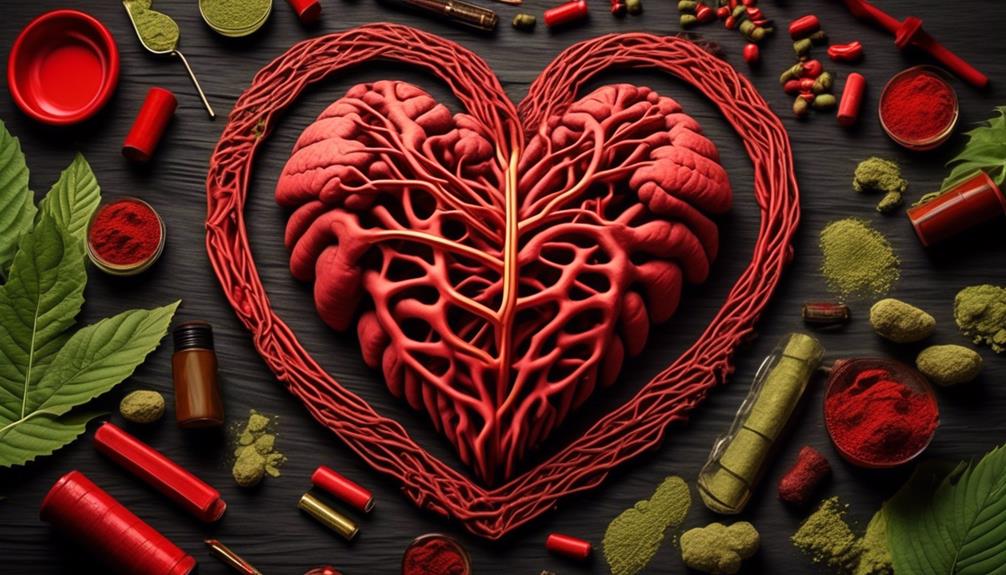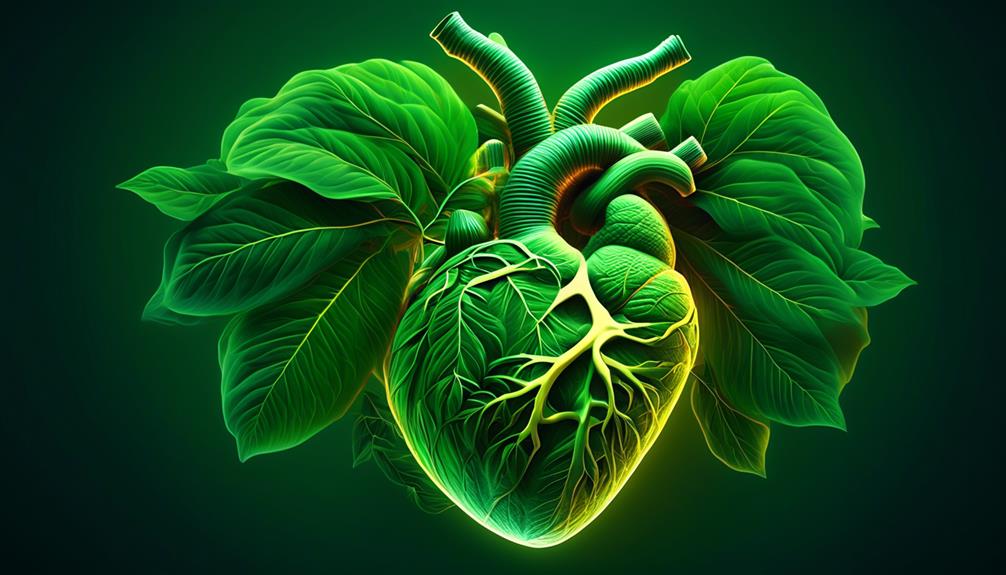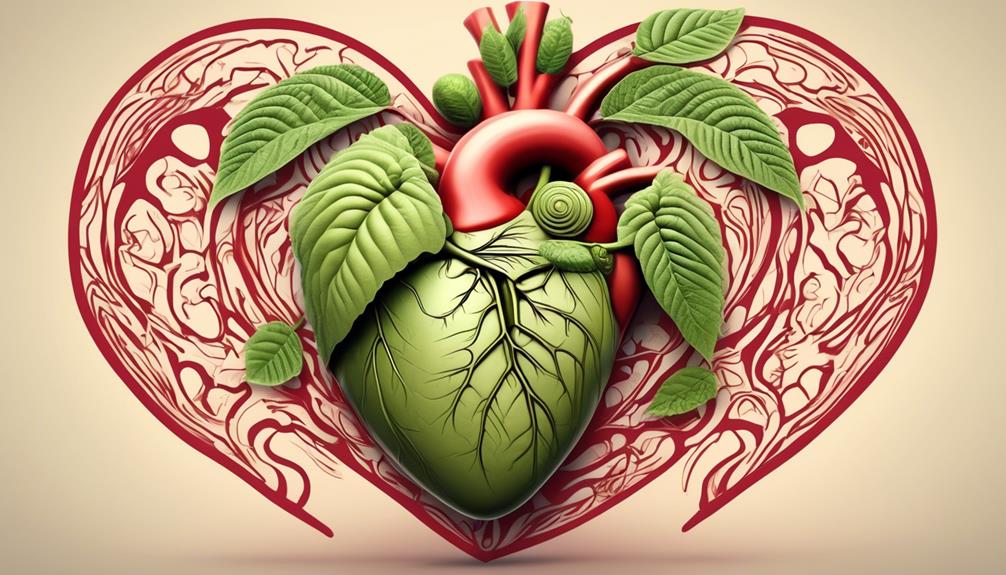Deprecated: mb_convert_encoding(): Handling HTML entities via mbstring is deprecated; use htmlspecialchars, htmlentities, or mb_encode_numericentity/mb_decode_numericentity instead in /home/users/kratomfiles/www/kratomfiles.com/wp-content/plugins/quick-adsense-reloaded/includes/template-functions.php on line 3552
So, you've heard about kratom and its potential benefits for pain relief and mood enhancement. But here's a little twist for you: did you know that this popular herbal supplement may also have some not-so-friendly effects on your heart? That's right, the same kratom that you thought could be your saving grace might actually pose a risk to your cardiovascular health. In this discussion, we'll explore the potential heart problems associated with kratom use, including hypertension, tachycardia, and arrhythmias. But that's not all – there's much more to uncover about the connection between kratom and heart complications. So, buckle up and get ready to dive deeper into this intriguing topic.
Potential Cardiovascular Risks

Kratom use poses potential cardiovascular risks, including elevated blood pressure and heart rate, as well as the possibility of developing arrhythmias and vasoconstriction affecting blood flow. Studies have shown that regular kratom users may experience adverse cardiovascular effects due to the active compound, mitragynine, present in kratom leaves. This compound acts on the cardiac receptors, leading to an increase in heart rate and blood pressure.
One of the most common adverse cardiovascular effects associated with kratom use is tachycardia, which refers to an abnormally rapid heart rate. This can be concerning as prolonged tachycardia may lead to heart muscle damage and increase the risk of developing cardiovascular diseases. Additionally, kratom has been reported to cause vasoconstriction, narrowing the blood vessels and impeding blood flow. This can result in reduced oxygen supply to vital organs, potentially leading to serious health complications.
Furthermore, kratom use has been linked to the development of arrhythmias, characterized by irregular heart rhythms. These arrhythmias can disrupt the normal electrical activity of the heart, impairing its ability to pump blood effectively. In some cases, individuals have experienced myocardial infarction or heart attack following kratom consumption, indicating potential cardiotoxicity.
It is crucial for healthcare providers and users to be aware of these adverse cardiovascular effects of kratom. Regular monitoring of blood pressure, heart rate, and the QTc interval (a measure of cardiac electrical activity) is recommended for individuals who use kratom regularly. If any cardiovascular symptoms occur, immediate medical attention should be sought to prevent further complications.
Adverse Effects on Heart Health
The use of kratom has been linked to various adverse effects on heart health, including cardiovascular toxicity, hypertension, and tachycardia. Kratom consumption can lead to prolonged QTc interval, which increases the risk of torsades de pointes, a potentially life-threatening ventricular arrhythmia. Reports from poison centers and clinical case studies have documented cases of adverse cardiovascular effects and toxicity associated with kratom use, including arrhythmias, hypertension, and even myocardial infarction. Autopsy reports have also provided evidence of sudden cardiac death, myocardial fibrosis, and myocardial infarction associated with kratom use, suggesting a potential link between kratom use and cardiovascular complications.
To emphasize the seriousness of these adverse effects, consider the following table:
| Adverse Effects on Heart Health |
|---|
| Cardiovascular toxicity |
| Hypertension |
| Tachycardia |
| Ventricular arrhythmia |
| Prolonged QTc interval |
| Increased risk of torsades de pointes |
Regular consumption of kratom, especially in individuals with unresolved underlying medical conditions or a history of polysubstance use, may increase the risk of experiencing these adverse cardiovascular effects. Furthermore, acute cardiovascular effects have been observed in individuals with a history of polysubstance use, suggesting a potential conflict between kratom and other substances.
It is important to note that kratom use is not only associated with adverse cardiovascular effects but may also lead to other health complications such as liver injury and left ventricular hypertrophy. The national poison data and clinical case studies highlight the potential cardiac eventualities that can arise from kratom use, emphasizing the need for further research and awareness regarding its potential risks to heart health.
Kratom and Heart Rhythm

Consuming kratom has been linked to disruptions in heart rhythm, raising concerns about the potential impact of this herbal substance on cardiovascular health. Understanding the effects of kratom on heart rhythm is crucial in evaluating the risks associated with its use. Here are some important facts to consider:
- Increased Heart Rate: Kratom use has been associated with tachycardia, which is an abnormally fast heart rate. This rapid heartbeat can put strain on the cardiovascular system and may lead to adverse cardiovascular effects.
- Elevated Blood Pressure: Kratom has been shown to cause hypertension, or high blood pressure. This can have detrimental effects on the heart and blood vessels, potentially leading to cardiovascular sequelae.
- Arrhythmias: Reports have linked kratom consumption to ventricular arrhythmias, which are abnormal heart rhythms originating from the lower chambers of the heart. These irregular rhythms can disrupt the normal functioning of the heart and may pose serious cardiac eventualities.
- Prolonged QTc Intervals: Kratom use has been associated with prolonged QTc intervals, which is a measure of the time it takes for the heart to recharge between beats. Prolonged QTc intervals can increase the risk of developing life-threatening ventricular arrhythmias.
It is important to note that the exact mechanisms by which kratom affects heart rhythm are not fully understood. However, the active ingredient in kratom, mitragynine, is believed to play a role in these cardiovascular effects. If you are a regular kratom user and experience any cardiovascular symptoms such as palpitations, chest pain, or shortness of breath, it is crucial to seek immediate medical attention. Monitoring your heart health and discussing the risks with your healthcare provider is essential, especially if you have any underlying cardiac conditions.
Link to Ischemic Heart Diseases
Given the adverse cardiovascular effects associated with kratom use, it is important to explore its potential link to ischemic heart diseases. Kratom consumption has been shown to have adverse cardiovascular effects such as increased heart rate, elevated blood pressure, and irregular heartbeat. These acute cardiovascular effects are concerning, as they can contribute to the development of ischemic heart diseases.
One of the key concerns with kratom use is its potential to cause prolonged QTc intervals. In vitro studies have demonstrated that the alkaloids in kratom can lead to an increased QTc interval, which is associated with an increased risk of arrhythmias. Prolonged QTc intervals can potentially lead to ventricular arrhythmia, a serious cardiac condition. This suggests that there may be a direct link between kratom consumption and the development of ischemic heart diseases.
Reports from poison centers have documented cases of adverse cardiovascular effects and toxicity related to kratom use. These reports highlight the potential dangers of kratom on cardiovascular health. Additionally, coroner and autopsy reports have provided evidence of cardiotoxicity and sudden cardiac death associated with kratom consumption, including myocardial fibrosis and infarction. These findings further support the potential link between kratom use and ischemic heart diseases.
Clinical case reports and studies have also described individuals experiencing prolonged QTc interval and an increased risk of arrhythmias after kratom use. This indicates that there may be an unresolved underlying mechanism by which kratom affects cardiovascular health. The risk of torsades de pointes, a specific type of ventricular arrhythmia, is also a concern in kratom-related cardiac eventualities.
Kratom-Related Cardiotoxicity

Kratom-related cardiotoxicity is a significant concern due to the documented adverse cardiovascular effects associated with kratom use. It is important to be aware of these potential risks when considering kratom consumption. Here are four key points to understand about kratom-related cardiotoxicity:
- Adverse cardiovascular effects: Kratom use has been linked to various cardiovascular sequelae, including hypertension, tachycardia (rapid heart rate), and arrhythmias. These effects can lead to serious complications and should not be taken lightly.
- Prolonged QTc: One specific adverse effect observed in some individuals who consume kratom is the prolongation of the QTc interval on an electrocardiogram (ECG). This prolonged QTc interval can increase the risk of a life-threatening ventricular arrhythmia known as torsades de pointes.
- Hypertension: Kratom use has been associated with elevated blood pressure, which can put strain on the cardiovascular system. This can increase the risk of cardiovascular events such as heart attack or stroke.
- Cardiopulmonary and cardiac eventualities: Kratom-related cardiotoxicity can manifest as various cardiopulmonary and cardiac complications. These may include chest discomfort or pain, shortness of breath, and even cardiac arrest in severe cases.
It is important to note that while there is evidence linking kratom use to adverse cardiovascular effects, there are methodological limitations in the available studies. More research is needed to fully understand the extent of kratom-related cardiotoxicity and the potential long-term consequences of heavy kratom use. In the meantime, it is advisable to exercise caution and consult with a healthcare professional before considering kratom consumption, especially if you have any pre-existing cardiovascular conditions. Stay informed and prioritize your cardiovascular health.
Can Kratom Use for Working Out Lead to Heart Problems?
Using kratom for workouts may lead to heart problems. The stimulating effects of kratom combined with the increased heart rate during exercise can put excess strain on the heart. It’s important to approach the use of kratom with caution, especially when paired with physical activity. Always consult a healthcare professional before use.
Can Kratom Use Lead to Heart Problems During Pregnancy?
Research suggests that kratom and pregnancy experiences may lead to potential heart problems for expectant mothers. The use of kratom during pregnancy can negatively impact the cardiovascular health of both the mother and the fetus. It is crucial for pregnant women to seek medical advice and avoid using kratom to ensure a healthy pregnancy.
Frequently Asked Questions
What Are the 4 Signs Your Heart Is Quietly Failing?
If your heart is quietly failing, there are four signs you should watch out for. You may experience increased heart rate, elevated blood pressure, irregular heartbeat, and chest discomfort or pain. These symptoms could be indicators of potential cardiovascular issues. It is important to recognize these signs and take action. Making lifestyle changes, such as incorporating cardiovascular exercise, adopting a healthy diet, managing stress, and understanding heart failure, can help improve heart health and prevent heart disease.
Can Kratom Cause Cardiotoxicity?
Yes, kratom can potentially cause cardiotoxicity, which refers to the harmful effects it can have on your heart. There are concerns about the long-term effects of kratom use on cardiovascular health, including its impact on heart rhythm and the possibility of heart failure. Researchers are still exploring the link between kratom and heart conditions, but there have been reports of cardiac side effects and sudden cardiac death associated with kratom consumption. It's important to be aware of these risks and educate yourself about kratom-related heart problems.
What Are at Least 3 Early Warning Signs of Heart Disease?
If you're concerned about heart disease, it's important to look out for early warning signs. Three common indicators include chest pain or discomfort, shortness of breath, and fatigue. These symptoms can be accompanied by high blood pressure, an irregular heartbeat, dizziness, swollen ankles, nausea, difficulty sleeping, and excessive sweating. Paying attention to these signs and seeking medical advice can help detect heart disease early and potentially prevent serious complications. Remember, taking care of your heart health is crucial for overall well-being.
What Are the 4 Signs of an Impending Heart Attack?
If you're wondering about the signs of an impending heart attack, it's important to be aware of certain warning signs. These include increased heart rate (tachycardia), chest discomfort or pain, elevated blood pressure, and irregular heartbeat (arrhythmia). These indicators can serve as early warning signs of a heart attack, so it's crucial to pay attention to any changes in your cardiovascular health. Remember, recognizing these symptoms and seeking medical attention promptly can make a significant difference in your well-being.









